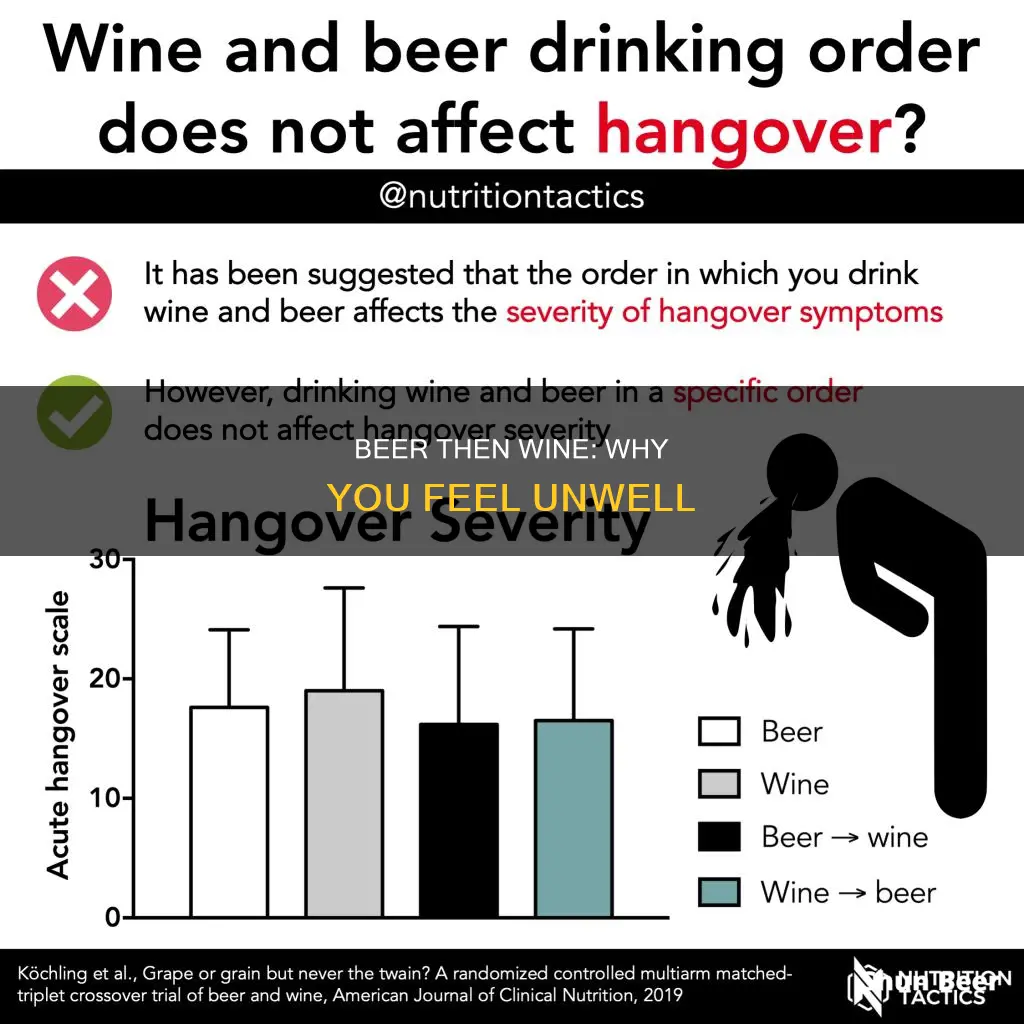
There are many old sayings about the order in which we should consume alcohol, such as beer before liquor, never been sicker; liquor before beer, you're in the clear. But do these sayings have any truth to them? Well, researchers at Witten/Herdecke University in Germany and the University of Cambridge in the UK set out to answer this question. They found that drinking order has little impact on the severity of hangovers. Instead, the best predictors of a bad hangover were how drunk the subjects felt and whether they vomited after drinking. Other factors that can affect your risk of a hangover include the amount of alcohol you drink, whether you ate before drinking, how frequently you drink, genetics, congeners, and smoking.
| Characteristics | Values |
|---|---|
| Is drinking wine after beer bad for you? | There is no scientific evidence to support this. |
| Why do people think this? | There are many theories, including the idea that beer is carbonated and causes alcohol to be absorbed faster, or that people tend to start with beer and move on to wine as the night progresses. |
| What does research say? | A study by Witten/Herdecke University in Germany and the University of Cambridge in the UK found no significant difference in hangover severity based on the order of drinks. |
| What influences a hangover? | Amount of alcohol consumed, how frequently you drink, genetics, congeners (natural compounds in alcohol), and smoking all play a role. |
What You'll Learn
- Beer's CO2 content may cause wine to be absorbed faster, intensifying intoxication
- The total amount of alcohol consumed matters more than the order of consumption
- Drinking lighter alcohols after stronger ones may be unwise
- Beer after wine may be worse than wine after beer due to the pyloric sphincter muscle
- Congeners in alcohol may worsen hangovers

Beer's CO2 content may cause wine to be absorbed faster, intensifying intoxication
Drinking wine after beer may or may not make you sick, but it's an idea worth exploring. Beers typically have a higher CO2 content than wines, and this may cause the alcohol from the wine to be absorbed faster, leading to more intense intoxication and a worse hangover.
CO2 or carbonation in beer can cause the alcohol to "hit your head" faster. This is why champagne, a carbonated drink, has such an exhilaration effect. It is not advisable to drink any high-CO2 drink after wine or stronger alcohols. The carbonation in beer can make you absorb the alcohol from wine more quickly and easily, leading to greater inebriation.
The pyloric sphincter muscle at the bottom of the stomach regulates the flow of food and drink into the intestine. Normally, this is closed, but when you drink a fizzy drink, the bubbles form on the stomach lining, stimulating the pyloric sphincter muscle and causing it to open, allowing food and drink into the intestine. The intestine has a much higher surface area to volume ratio than the stomach, which allows for much increased absorption of nutrients and alcohol. When you drink wine, it sits in the stomach and is slowly released into the intestine. If you then drink a carbonated beer, the bubbles cause the pyloric sphincter muscle to open, allowing both the beer and the wine into the intestine, where they are rapidly absorbed.
However, it's important to note that recent studies have found no correlation between drinking order and hangover symptoms. Researchers at Witten/Herdecke University in Germany and the University of Cambridge in the UK found that no rhyme or drinking order could prevent a hangover. Their study showed that participants reported similar hangover scores regardless of whether they drank beer before wine or wine before beer.
While the drinking order may not matter, other factors do influence the intensity of hangovers. These include vomiting, perceived drunkenness, the amount of alcohol consumed, whether you ate, how frequently you drink, genetics, congeners (natural compounds in liquor), and smoking.
Beer and Symbicort: Is It Safe to Drink?
You may want to see also

The total amount of alcohol consumed matters more than the order of consumption
The idea that drinking wine after beer will make you sick is just a myth. In fact, the total amount of alcohol you consume matters more than the order in which you consume it.
This idea has been tested by researchers at Witten/Herdecke University in Germany and the University of Cambridge in the United Kingdom. They recruited 90 participants aged 19 to 40 and split them into three groups. The first group consumed 2.5 pints of cold lager beer followed by four large glasses of chilled white wine. The second group had the same amount of alcohol but in reverse. The third group, the control group, drank only wine or beer. Throughout the experiment, researchers asked participants about their well-being and their level of drunkenness on a scale of 1 to 10. The next morning, the participants were asked if they were experiencing any hangover symptoms, which they ranked from 0 to 56. A week later, the participants returned to the study facility and repeated the experiment in reverse.
In the end, the researchers found no significant differences in hangover scores among the three groups. No matter their drinking order, participants reported similar hangover scores. According to Dr. Tarek Hassanein, a specialist at the Southern California Liver Centers and a professor of medicine at the University of California San Diego School of Medicine, "The order in which you drink alcohol does not matter because it all reflects on how many grams of alcohol the person is drinking. Over 30 grams for men and over 20 grams for women a day is deleterious to the liver, irrespective of the type of alcohol."
Other factors that can affect your risk of a hangover include the amount of alcohol you drink, whether you ate before drinking, how frequently you drink, genetics, congeners (natural compounds in liquor that give off distinctive flavors and color characteristics), and smoking.
So, if you're looking to avoid a hangover, it's more important to pay attention to the total amount of alcohol you're consuming and the other factors mentioned above, rather than the order in which you're consuming your drinks.
Powerlifters and Beer: A Match Made in Heaven?
You may want to see also

Drinking lighter alcohols after stronger ones may be unwise
However, recent research has found that the order in which you drink alcohol does not matter. A study conducted by researchers at Witten/Herdecke University in Germany and the University of Cambridge in the United Kingdom found no significant differences in hangover scores among participants who drank beer followed by wine, and those who drank wine followed by beer. The study concluded that it is the amount of alcohol, not the order in which you drink, that matters when it comes to hangovers.
Other factors that can affect your risk of experiencing a hangover include the total amount of alcohol consumed, whether you drank on an empty stomach, how frequently you drink, genetics, and the congeners (natural compounds) in the alcoholic beverage.
Cattle and Beer: A Drinking Curiosity
You may want to see also

Beer after wine may be worse than wine after beer due to the pyloric sphincter muscle
Drinking wine after beer may be worse than drinking beer after wine due to the pyloric sphincter muscle and how it is affected by alcohol. The pyloric sphincter is a muscle at the bottom of the stomach that needs to relax and release for food to move from the stomach to the intestines in a process called gastric emptying. A 2020 study published in the Journal of Investigative Medicine found that chronic overconsumption of alcohol can lead to delayed gastric emptying.
The pyloric sphincter's function can be affected by alcohol, according to a 1979 study that looked at the effects of an intoxicating dose of alcohol (79 grams of 100-proof alcohol) on the pyloric sphincter in 12 normal subjects. The study found that while alcohol had no effect on resting pyloric sphincter pressure, it did decrease the pyloric pressure response to duodenal acidification. This suggests that an intoxicating dose of alcohol may interfere with the normal function of the pyloric sphincter.
While the study did not specifically look at the order of drinking beer and wine, it is possible that drinking wine after beer could be worse for the pyloric sphincter muscle due to the higher alcohol content in wine. Wine typically has a higher alcohol content than beer, so drinking wine after beer could result in a higher overall alcohol intake, which may further interfere with the function of the pyloric sphincter.
However, it is important to note that other factors, such as carbonation, the total amount of alcohol consumed, and individual factors such as age, sex, body weight, and drinking habits, may also play a role in how drinking wine after beer affects an individual.
Beer Drinking: Heart Health Risks and Strains
You may want to see also

Congeners in alcohol may worsen hangovers
Congeners are compounds produced during the fermentation or distillation process of alcohol manufacturing. They are by-products of the reaction that converts sugars into alcohol. The amount of congeners in a drink depends on the carbohydrate used, the original sugar, and the yeast strain that ferments the sugar. For example, the amount of congeners in alcohol made using grapes or cereal grains differs.
Congeners give alcoholic drinks their particular taste and aroma. For instance, acetaldehyde gives rums and bourbons a fruity smell, while isobutylene alcohol has a sweet smell.
Drinks that are darker in colour tend to have higher congener levels than lighter-coloured drinks. Tequila, cognac, whiskey, and bourbon are drinks high in congeners, while clear alcoholic drinks such as white wine, light rum, light beer, gin, and sake are low in congeners.
Research suggests that congeners may worsen hangovers. For example, methanol, a congener found in high quantities in brandy and rum, breaks down into formic acid and formaldehyde, which can worsen hangovers. However, congeners are not the only cause of hangovers. Other factors include dehydration, disrupted sleep, gastrointestinal irritation, inflammation, and acetaldehyde exposure.
To avoid worsening hangovers, it is recommended to limit the consumption of dark alcohol, drink water to stay hydrated, avoid drinking on an empty stomach, and get adequate sleep after drinking.
Is Old Beer Safe to Drink?
You may want to see also
Frequently asked questions
There is no scientific evidence to support the claim that drinking wine after beer will make you sick. A study conducted by researchers at Witten/Herdecke University in Germany and the University of Cambridge in the United Kingdom found no significant difference in hangover scores among participants who drank beer followed by wine, and those who drank wine followed by beer.
There are a few possible explanations for this belief. One theory suggests that beer is typically consumed at the beginning of an evening, followed by wine or liquor later in the night. If people get sick after drinking a mix of beverages, they may attribute it to the order in which they were consumed. Another theory suggests that the high alcohol content in liquor can spike blood alcohol levels more quickly than beer, so finishing the night with liquor after drinking beer can push blood alcohol content over the edge, leading to a hangover.
Yes, factors such as the total amount of alcohol consumed, drinking on an empty stomach, frequency of drinking, genetics, and congeners (natural compounds in alcohol) can all influence the likelihood and severity of a hangover.
Congeners are natural compounds found in alcoholic beverages that contribute to their taste, smell, and look. Drinks with more congeners, such as red wine or whiskey, tend to lead to more severe hangover symptoms than drinks with fewer congeners, like gin or vodka.
There could be various biological, psychological, or social factors at play. Age, diet, type of alcohol consumed, and past experiences can all influence how alcohol affects you. It is recommended to consult a healthcare provider to discuss steps to prevent sickness and ensure there are no underlying health issues.







